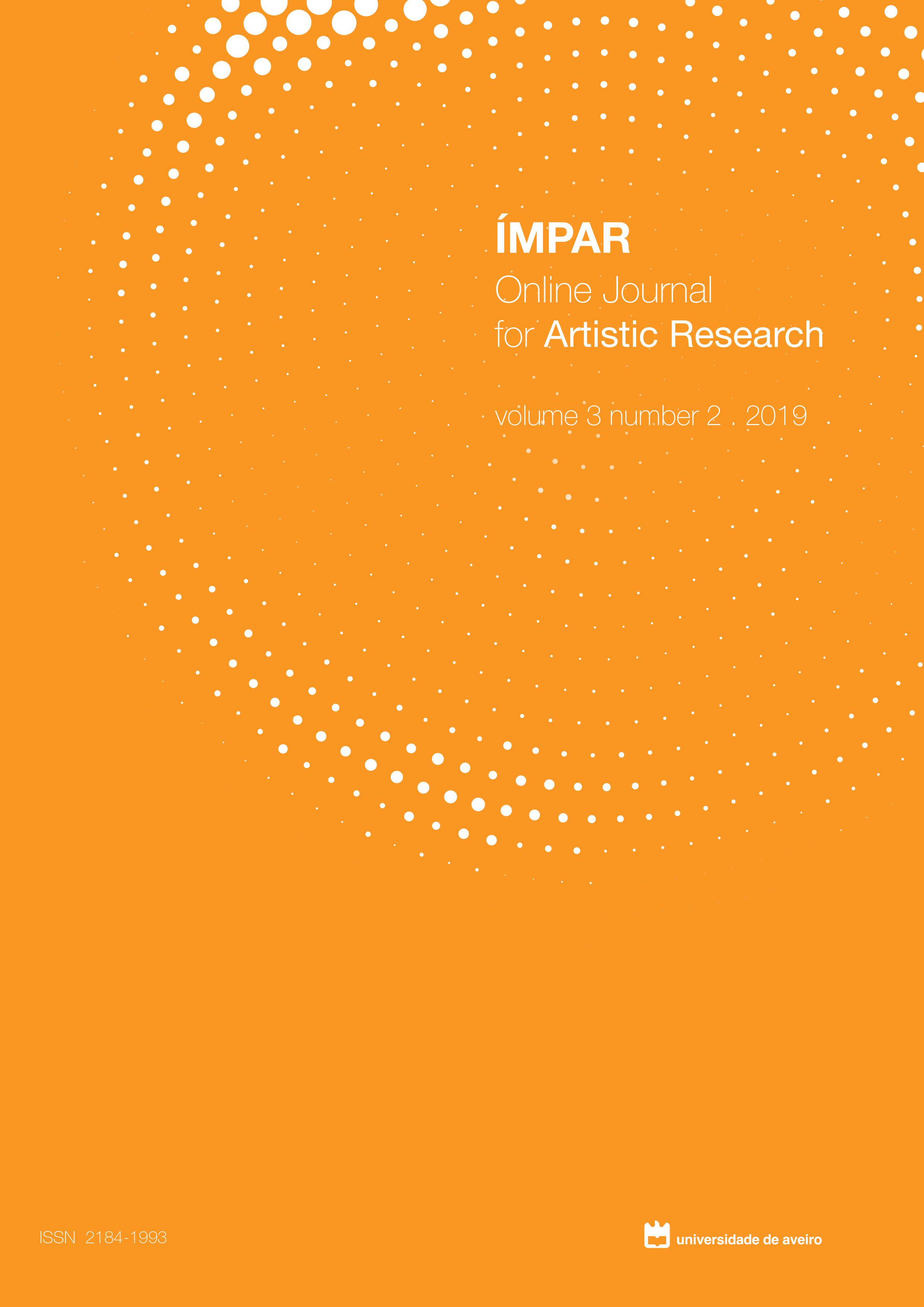On the reality clarified by art
Abstract
In this article, I propose that there is a reality that can be clarified by art. This mode of reality — the ontologically subjective — is by definition inaccessible to science. Artistic creation hence stands as the academic endeavour which is better equipped to provide a suitable ground for its clarification, here understood as providing the means for a shared comprehension of such reality. However, not all artistic creation aims to do that and, if misdirected — as when it follows research methods and procedures borrowed from science —, it can’t help but fail to do so. We thus face the challenge of defining a focus that is specific to artistic creation and that can help art to accomplish its full potential within the academy.
References
Almeida, C. (2015a). The Problem of Artistic Research. Sisyphus Journal of Education, 3(1),
136-171. https://doi.org/10.25749/sis.7723
Almeida, C. (2015b). After Artistic Research: What follows the establishment and the realization of the establishment of the phenomenon. (Doctoral dissertation). Porto, Portugal: Universidade do Porto. Retrieved from https://repositorio- aberto.up.pt/handle/10216/81683
Andresen, S. (2015). Obra Poética. Porto, Portugal: Assírio & Alvim.
Arendt, H. (1981). The life of the mind. New York, NY: Harcourt Brace Jovanovich (e-book).
Arendt, H., & Scholem, G. (2017). The correspondence of Hannah Arendt and Gershom Scholem. Chicago, IL: The University of Chicago Press.
Aristotle. (1926). The art of rhetoric. Cambridge, MA: Harvard University Press.
Baldwin, J. (2012). Notes of a Native Son. Boston, MA: Beacon Press (e-book).
Ball, P. (2015). A brave new word. Retrieved from
https://www.chemistryworld.com/opinion/a-brave-new-word/8289.article
Bartlett, T. (2013). The Philosophers That Philosophers Like Best. Retrieved from
https://www.chronicle.com/blogs/percolator/the-philosophers-that-philosophers-like- best/31917
Berger, J. (2016). Confabulations. London, UK: Penguin Books.
Borges, J. L. (1999). Collected fictions. London, UK: Penguin Books.
Borges, J. L. (2000). This craft of verse. Cambridge, MA: Harvard University Press.
Brecht, B. (2007). Against Georg Lukács. In T. Adorno, W. Benjamin, E. Bloch, B. Brecht, & G. Lukács, Aesthetics and politics (pp. 68-85). London, UK: Verso.
Coessens, K., Crispin, D., & Douglas, A. (2009). The artistic turn: A manifesto. Ghent, Belgium: Orpheus Instituut.
Croft, J. (2015). Composition is not Research. Tempo, 69(272), 6-11. https://doi.org/10.1017/S0040298214000989
Damasio, A. (1995) Descartes' error: emotion, reason, and the human brain. New York, NY: Avon Books.
Danto, A. (1964). The Artworld. The Journal of Philosophy, 61(19), 571-584. https://doi.org/10.2307/2022937
Davidson, D. (2001). Subjective, Intersubjective, Objective. Oxford, UK: Clarendon Press.
Dewey, J. (2005). Art as Experience. New York, NY: Perigee.
Dickie, G. (1969). Defining Art. American Philosophical Quarterly, 6(3), 253-256.
Eliot, T. S. (1971).Four quartets. New York, NY: Harcourt Brace Jovanovich (e-book).
Emerson, R. W. (2004). Essays and poems. New York: Barnes & Noble Classics (e-book).
Foucault, M. (1983). Self Writing. Retrieved from
https://foucault.info/documents/foucault.hypomnemata.en/
Harman, G. (2018). Object-oriented ontology: A new theory of everything. London, UK: Pelican Books.
Hume, D. (2007). An enquiry concerning human understanding. Oxford, UK: Oxford University Press.
Kiefer, A. (2015). A arte há de sobreviver às suas ruínas. Porto, Portugal: Deriva Editores. Kuhn, T. S. (1962). The structure of scientific revolutions. Chicago, IL: University of Chicago
Press.
Markson, D. (1988). Wittgenstein's mistress. Elmwood Park, IL: Dalkey Archive Press.
Nagel, T. (1974). What is it Like to be a Bat?. The Philosophical Review, 83(4), 435-450. https://doi.org/10.2307/2183914
Nagel, T. (1979). Mortal Questions. New York, NY: Cambridge University Press.
Nagel, T. (1986). The view from nowhere. New York, NY: Oxford University Press.
Ortega y Gasset, J. (1964). Obras Completas, Vol. VI. Madrid, Spain: Revista de Occidente
Penha, R., & Carvalhais, M. (2018). Will Machinic Art Lay Beyond Our Ability To Understand It?. Paper presented at ISEA 2018 - 24th International Symposium on Electronic Art, Durban, South Africa. Retrieved from http://www.isea- archives.org/docs/2018/proceedings/ISEA2018_Proceedings.pdf
Portela, P. (2017). Patrícia Portela – Entrevista. Retrieved from
https://coffeepaste.com/patricia-portela-entrevista/
Snow, C. P. (1993). The Two Cultures. London, UK: Cambridge University Press.
Sontag, S. (1966). Against interpretation and other essays. New York, NY: Farrar, Straus &
Giroux.
Tolstoy, L. (1995). What is Art? London, UK: Penguin Books (e-book).
Winner, E. (2019). How art works: A psychological exploration. Oxford, UK: Oxford University
Press.
Wittgenstein, L. (2001). Tractatus logico-philosophicus. London, UK: Routledge.

Copyright (c) 2020 ÍMPAR: Online Journal for Artistic Research

This work is licensed under a Creative Commons Attribution 4.0 International License.




